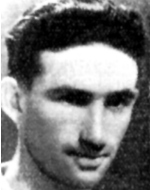Son of-Sarah and Haim-Yitzhak was born on 24.11.1916 in Beregsas, in northeastern Hungary, after two years to Borakhovo in Carpathian Russia, then Czechoslovakia. From the age of four, he studied at Chafarim and at the age of 12 he already learned to study a Gemara and Tosafot page himself. At the same time, he studied in public schools – high school and high school – and he also excelled in his astonishing conception, but in his soul the desire for redemption increased, and he turned Hungarian patriotic songs into Jewish ones by replacing the names of the people and the country. State anthem song at school. The teacher felt the change and asked him who did it, Jacob confessed. Out of the love of the teacher for the outstanding student, he did not make do with a warning. From the age of 14, he studied at the “Yeshiva” in Szorani, Slovakia. After 2-3 years he joined the Bnei Akiva movement and guided it. In 1936 he entered the Hechalutz ha-Dati movement and became a member of the Hechalutz Hehalutz movement. He was trained near Marinbad and Bratislava and later managed a branch of his movement in Bardejov, Slovakia. During the general mobilization for the Czechoslovak crisis in 1938 in Carpathian Russia that was returned to Hungary, he foresaw the approaching war and sought ways to reach Palestine. At first he sneaked across the border to Czechoslovakia and served as a guide for youth training of Bnei Akiva near Prague, and after the capture of the rest of the country by Hitler’s armies, he left with a group of immigrants through Yugoslavia and arrived in Palestine. “He worked in a quarry in Karkur, in the orchards of the environment and in the farmers’ farms in Givat Ada, served in the committees and institutions of the group, and worked diligently on training in the Haganah. And they had three sons, and the group immigrated to settle in Kfar Etzion and settled for farm work and public service Member of the Secretariat, the Secretary of Internal Affairs and member of various committees. Excelled coldly known as special and impossible to get him out of his way. During World War his parents came down and settled in Kfar Haroeh. His brothers and sisters also immigrated to Israel and they persuaded him to join them. But he could not and did not want to leave the group and the place, which he had contacted with Lev and soul and had taken his place with great effort. In the Security Service, he served as a corporal of the Nutris in the area and later as responsible for the Nutris in the entire bloc. He graduated cum laude from the regional course for squadrons and the national course for armored personnel carriers, was appointed commander of the district and devoted himself to training people throughout the bloc. With the outbreak of the War of Independence he was appointed deputy commander of the Gush. His family was transferred to Jerusalem with the evacuation of the mothers and children, and he devoted himself entirely to his responsibility and complications. In addition to the task of protecting the isolated bloc in a hostile Arab sea and disrupting regular transportation to the Gush and from it passing through the Hebron road, while maintaining the hostile order of the British, he was beset by complex economic, religious and social problems, She was inclined to bear the heavy burden without losing his temper until the last moment. In the most difficult cases, he wrote personal letters to representatives of the group next to the institutions and refrained from writing official correspondence requiring copies for safekeeping. His face showed signs of his great fatigue from the days and nights of war, but he could hide his despair under the guise of coolness and encouraging smiles. On the last night he made various arrangements according to the needs and possibilities of the battle (blowing up enemy armored vehicles that remained stuck, reducing the protective area, taking care of the wounded, contacting the institutions and the command)Lyon, etc.), and in consultation with the commanders, he said: “I do not believe in surrendering to the Arabs, there is no choice but to fight until the last bullet.” By that time he was actually the commander of the Gush, after the commander (Mosh) fell on Tuesday morning in Iyar. When he received a telegram at Ein Zurim in Jerusalem and Tel Aviv at midnight, he replied: “Kfar Etzion prefers to remain in the area if it is possible to hasten reinforcements, and if not, we agree to the evacuation.” But that possibility was no longer there. The next day, at 7 AM, on 4 May 1948, Yaakov broadcast to mothers and children in Jerusalem: “Fifteen minutes ago, the attack on us was renewed with tanks, artillery and mortars. I know you are in a difficult situation. Let’s hope you hold on. Our spirit is firm. “At noon, the enemy’s armored vehicles broke into the courtyard of the village and Yaakov gave his last order to spoil the weapon and then fell in one of the eastern positions of Kfar Etzion, and on the 17th of Cheshvan 5710 (November 17, 1949) To rest at the military cemetery on Mount Herzl in Jerusalem.
